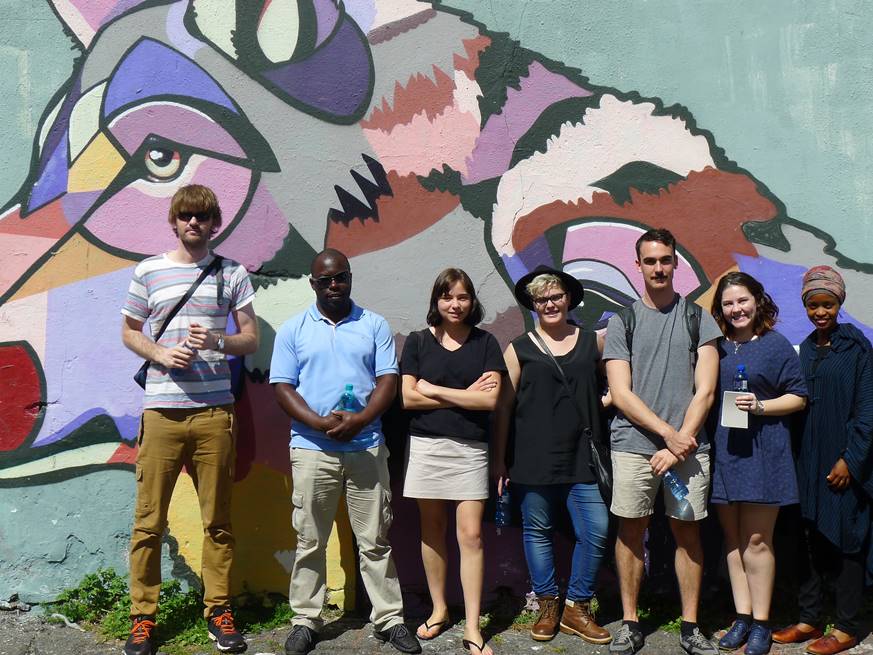The Department of English focuses on the study of local and international literature written in English, and also offers elective courses in literary, film and cultural studies as well as creative writing.
For more than three centuries, the Cape has served as a passageway linking West and East, North and South. This conjunction of the local and the global, of time and place, consciously informs our goals in the Department of English at Stellenbosch University. In our teaching and research, we ask how – and why – modes of reading, representation and textuality mean differently, in different times and locales, to different constituencies.
We envisage the discipline as a series of transformative encounters between worlds and texts, a process of reading, thinking, debate and writing which is well-placed to contribute not only to our students’ critical and creative knowledge of ‘English’ as a discipline, but also to the possibilities for change in Stellenbosch, a site still marked by racial and economic disparity. If novels by Chimamanda Adichie and Abdulrazak Gurnah, poetry from the Caribbean, and articles by Njabulo S. Ndebele can prompt revised recognitions of racial, cultural and gendered identities, so too can fiction by Olive Schreiner or poetry by Walt Whitman open us to challenging points of view about the relation between identity and inherited ideas, postcolonial theory and the politics of the local. Our research areas (among them queer theory, critical nature studies, diaspora studies, life writing, visual activism, the Neo-Victorian and contemporary poetry) contribute to our diverse ability to position ‘English’ as a space of literatures, languages and cultural studies which engages a deliberately wide range of thought, expression and agency. We aim to equip our graduates with conceptual and expressive proficiencies which are central to careers in media, education, NGOs, law, and the public service. Simultaneously, we recognize that capacities of coherent thought and articulation can play an important role in democracy and transformation.
In the English Department, we encourage a collegial, inclusive research community in which all participants (staff, postgraduates and undergrads, fellows, professors extraordinaire and emeriti) are prompted to produce original and innovative scholarship. To this end, there is a programme of regular events in the department, among them research seminars featuring regional and international speakers; workshops on research methods, proposal writing, and creative writing, and active reading and writing groups. Such platforms complement the department’s vibrant InZync poetry project, and the digital SlipNet initiative (http://slipnet.co.za/), enabling us to create a teaching and learning environment in which the pleasures and challenges of ‘English’ as ‘englishes’ can be publicly performed and debated, in Stellenbosch and beyond.
The undergraduate core courses range widely over different periods, genres and localities, providing instruction in traditional areas of English literary studies as well as in postcolonial literary studies and cultural studies. Through its emphasis on small-group teaching seminars, our curriculum enables students to their studies according to their own interests and needs.
The intensive Honours course both consolidates the work done at undergraduate level with a compulsory theory course in twentieth century thought pertinent to literary and cultural studies, and a compulsory long research essay that prepares the ground for study at Masters level. Here staff teach in their areas of research and students choose from a range of topics as diverse as nineteenth century studies, contemporary East African studies, literary practices, narrative theory, ecocriticism, biographical studies and modernity.
Over the last few years we have recruited a large and diverse body of masters and doctoral students from scattered geographies who work more often than not with a supervisory team, and also participate in our research seminar programme as well as in courses offered in the African Doctoral Academy and in a number of reading groups organised by staff. Staff and postgraduate students are active in a number of Departmental projects like our Transitions and Translations project which sets up collaboration with colleagues from a number of partner universities in East, West and Southern Africa, and has brought a new dynamic to our work in African literature. The Stellenbosch Literary Project (SLiP), its website (SLiPNet) and the public performance sessions of Inzync have engaged staff and students with a wider public in ways that have opened us to the power of the critical word, of literature and the performative in our contemporary lives.
Our fifteen full-time members of staff and twelve tutors (who are also our postgraduate students) are committed to the value of the critical imagination, of hard work and to an esprit de corps in the Department. We have, we believe, a vibrant and supportive place of study and of personal growth in an institution that is attempting to re-invent itself.

